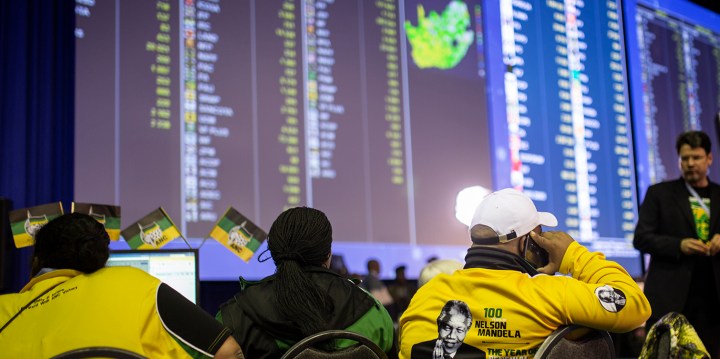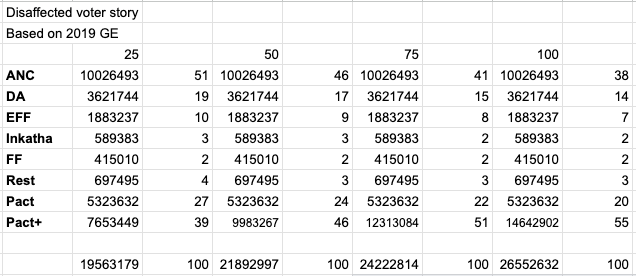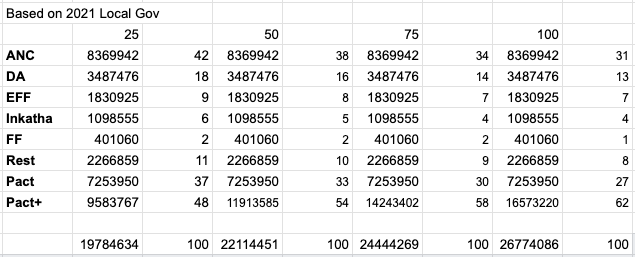BUSINESS REFLECTION
After the Bell: The 2024 election and the prospect of achievable, attainable dignity

It takes much less than most people would normally guess for election swings to happen. These changes may be even more surprising for South Africans because we have become so used to the notion that the ANC is entrenched in power and likely to remain so.
During this week’s discussion between myself and merchant banker Mark Barnes on our podcast, the subject of the elections next year came up. We both make a real and resolute effort to put as little as possible preparation into this podcast as we can because we just don’t want to sound like a lecture on the feeding habits of the Caribbean canary. But this time we tripped up a bit because we were forecasting against numbers that were not to hand.
So, allow me in this space, with the benefit of some actual calculations and some actual numbers, to illustrate more precisely what we were talking about in a broad concept. Barnes’ general point was that we might be surprised at how easily the election result next year could shock the country.
Whether you want this result, or whether you don’t want that result, is really not germane here. The point is that it takes much less than most people would normally guess for election swings to happen. These changes may be even more surprising for South Africans because we have become so used to the notion that the ANC is entrenched in power and likely to remain so. As it happens, I’m in that camp, so these numbers were an eye-opener for me, too.
The principal issue here is the deceptiveness of mathematics, particularly of percentages. We tend to think about elections in percentage terms; which party got what percentage, etc. But percentages are often trixie little minxes. The main problem is that there is a difference between the concept of a percentage and percentage change. In addition, often without including the absolute numbers, a percentage change can be deceptive.
For example, if a cool drink has “20% less sugar”, but half the drink consists of sugar, you are still getting a thumping quantity of sugar. If your gold ring has “20% more gold” but it only had a smidgen of gold in the first place, it’s not much more valuable — certainly not 20% more valuable.
So, just imagine this scenario when it comes to the elections next year.
In 2019, the ANC won 57.5% of the total vote. The next closest party was the DA with 20.8%. That is a pretty decisive win for the ANC; it’s less, of course, than the ANC has won previously, but still, the victory was overwhelming. So, what would it take to change that?
Consider this scenario. One of the aspects of the 2019 vote was that voter turnout was pretty bad. In total, 66% of registered voters — that’s not eligible voters, that’s registered voters — didn’t vote. So, what would happen if those registered, non-voters were to turn up this time?
Well, how many of them are there? The number is pretty big; it’s more than 9 million people. As illustrated in the graph above, let’s assume that 25% of the voters who didn’t vote decided to turn up this time and voted for the Moonshot Pact, or the Multi-Party Charter as it’s now known (that’s the Pact+ number).
All of a sudden, the ANC majority slides to 51%. If half turn up and vote for the pact, the ANC’s share of the vote slides to 46%, and in this case, the pact is suddenly the single largest party. In the absurdly impossible case that 75% of the voters who didn’t vote last time turn up and vote for one or other parties in the pact, not only is the pact the largest party, but it gets more votes than the ANC and the EFF combined.
That’s a pretty high bar for the pact to hurdle. But this graph actually tilts in favour of the ANC because we are talking about SA five years ago. What if we do the same calculation but with more recent figures? Enter Graph Two.
This is based on the results of the local government election in 2021, which reflect more or less the same as the most recent polling numbers. Now, if I was an ANC leader, these numbers would make me very worried.
To sum it up, if the pact manages to get half the voters who didn’t vote last time to vote this time and vote for them, then the ANC and EFF put together won’t have enough votes to rule. Incredible.
That is something to wrap our heads around but, frankly, I just don’t think it’s going to happen. For one thing, local government elections have tended to over-index toward the opposition because voter turnouts are lower.
For another thing, in 2021, there were a large proportion of new parties and independents; its seems unlikely that all of these voters will all vote for one of the parties in the pact.
Third, there will be a whole new generation of voters coming on stream and in the past, a good proportion of them voted the way their households voted; in most cases that means voting for the ANC.
And fourth, voters who didn’t turn out last time probably won’t turn out this time. Some will, but most won’t.
Still, the numbers massively support Barnes’ point: you have to believe that change can result from your own efforts. And extrapolating that beyond the political debate introduces the prospect of individual agency and achievable, attainable dignity. DM



















 Become an Insider
Become an Insider
Dignity cannot be bestowed or even earned unless you can live by these tenets….
The 7 Pillars of Dignity & Respect
Start with You. Understand how you see yourself, how others see you, and how your filters guide you, and influence your behavior. …
Sweat the Small Stuff. Understand the concepts of intent vs. …
Build Cultural Awareness. …
Find Common Ground. …
Join the Team. …
Lead the Way. …
Do the Right Thing.
How many of our so called leaders really have any real ‘dignity’ .
If the people that put them in positions of power don’t understand this then we remain on the road to Zim.
The problem with all these over-optimistic forecasts for how well the opposition will do in next year’s election is that, in the likely event that the ANC wins more than 50%, many many people will despair and the economy and investment will suffer.
Everyone needs to acknowledge that the chance that the ANC gets less than 50% is quite small. It is unlikely. And then adjust their expectations accordingly.
The more realistic goal is that the opposition could perhaps win one or two more provinces (Gauteng and KZN). That will be a very good outcome.